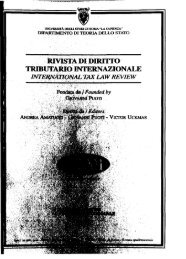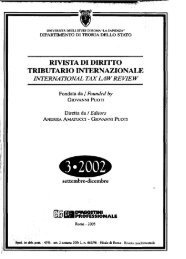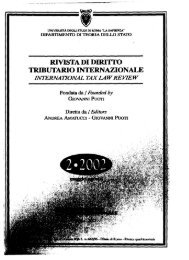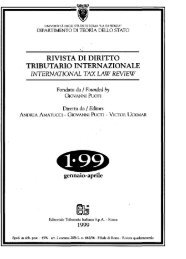RIVISTA DI DIRITTO TRIBUTARIO INTERNAZIONALE - Rdti.it
RIVISTA DI DIRITTO TRIBUTARIO INTERNAZIONALE - Rdti.it
RIVISTA DI DIRITTO TRIBUTARIO INTERNAZIONALE - Rdti.it
You also want an ePaper? Increase the reach of your titles
YUMPU automatically turns print PDFs into web optimized ePapers that Google loves.
G. Petrillo: Interpellation in the Statute or Ta.xpayers' Rights<br />
examination consists of a series of provisions safeguarding the taxpayer's<br />
right of defence: for example, the provision that recognises the<br />
right to suspension of tax-collection when appropriate secur<strong>it</strong>y is offered<br />
by the taxpayer; the prohib<strong>it</strong>ion of seizure and attachment of<br />
goods in the course of the proceedings, provided the Administration<br />
runs no risk of loss of secur<strong>it</strong>y; the automatic suspension of collection<br />
of alI fines in the presence of an appeal (68); the generaI presumption<br />
of the taxpayer's good fa<strong>it</strong>h w<strong>it</strong>h the consequent obligation for the administration<br />
to provide proof of guilt in view of the application of<br />
fines; lastIy, in the context of an "economico-administrativa" procedure,<br />
the possibil<strong>it</strong>y for those who file a complaint in first instance to<br />
apply directIy to the "Tribunal Economico - Administrativo CentraI",<br />
skipping the "Tribunal Regional o [oca!" (69).<br />
Again on this topie, see Santiago Ibànez Marsilla, Un l1uevo procedimiento sancionador<br />
en materia tributaria, pero ibasta con guardar las (onnas?in Revista Internauta<br />
de Pràtica luridica, n.l!1999, who deerns that the impos<strong>it</strong>ion of "sanciones"<br />
presupposes the exercise of the ius puniendi of the State, in conflict w<strong>it</strong>h the pos<strong>it</strong>ion<br />
held by other doctrinal author<strong>it</strong>ies (Bayona de Perogordo, l.J.: El procedimento<br />
sancionador", Conferencia pronunciada en el Curso sobre evasiòn y fraude fiscal,<br />
UIMP, Santander, 1994, recogida por Soler Roch, M. T.: "Deberes tributarios y Derechos<br />
Humanos", Revista Tècnica Tributaria, n. 30, 1995) which defines the exercise<br />
of pun<strong>it</strong>ive power as a tool intended to re-establish a balance broken by those who<br />
do not rneet their taxation obligations te the detriment of those who do. Again w<strong>it</strong>h<br />
regard to the new fining system outlined by the LDGC, see Josè Garberi Llobregat,<br />
El nuevo règimen sancionador en materia tributaria, via internet: httpll noticias. juridicas.com.<br />
(68) On this point, see luan Martìn Queralt, Carmelo Lozano Serrano, Gabriel<br />
Casado Ollero, losè Manuel Tejerizo Lòpez, Curso de derecho financiero y tributario,<br />
who draw attention to the substantial harmony existing, in praetical terms, between<br />
the above preeept and Art. 138.3 of Ley 30/1992 which, consistently \v<strong>it</strong>h the fundamental<br />
right to the presumption of innoeence,. foresees that the penalties beeome enforceable<br />
at the ti me when they have become final from the administrath'e standpoint.<br />
Upon comparison \,\,'<strong>it</strong>h our system, <strong>it</strong> ean be seen that the Spanish taxpayer enjoys<br />
greater proteetion, sinee Art. 19 of Legis. Deeree 472/97, which is certainly not<br />
above er<strong>it</strong>icism, extends as per Art. 68 Lgs Decr 546/ 92) to fiscal penalties the principle<br />
of fractioned collection whil e judgement is pending, foreseeing however the possibil<strong>it</strong>y<br />
for the regional tax disputes board, at the party's request and against provision<br />
of secur<strong>it</strong>y, to suspens the execution of the contested act \'\''<strong>it</strong>hin the lim<strong>it</strong>s w<strong>it</strong>hin which<br />
the Iatter can be enforced after the first-Ievel verdict.<br />
(69) This was aimed to meet a strongly-felt social demand for rapid and economie<br />
administrative justice, in order to speed up the settlement of "Ias reclamaciònes"; in<br />
this manner, the latter can be settI ed, as a ruIe, before a single court: the "Tribunal Regional<br />
o Local", for cases of lesser amount, or the "Tribunal Centrai" for those of<br />
greater amount.<br />
<strong>RIVISTA</strong> <strong>DI</strong> <strong>DI</strong>RITTO TRlBFTARIO INTER\AZIONALE 3121101






